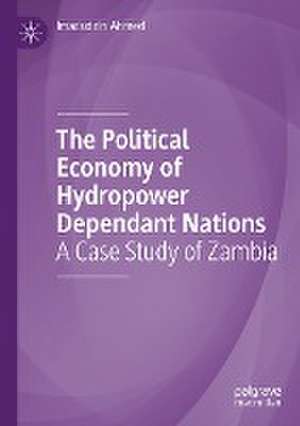The Political Economy of Hydropower Dependant Nations: A Case Study of Zambia
Autor Imaduddin Ahmeden Limba Engleză Paperback – 6 aug 2022
The book offers supply-side and demand-side recommendations at the national, continental, and global level and contains original data collected to highlight the impact of power outages on manufacturing firms.
| Toate formatele și edițiile | Preț | Express |
|---|---|---|
| Paperback (1) | 724.63 lei 6-8 săpt. | |
| Springer International Publishing – 6 aug 2022 | 724.63 lei 6-8 săpt. | |
| Hardback (1) | 729.84 lei 6-8 săpt. | |
| Springer International Publishing – 5 aug 2021 | 729.84 lei 6-8 săpt. |
Preț: 724.63 lei
Preț vechi: 883.69 lei
-18% Nou
Puncte Express: 1087
Preț estimativ în valută:
138.67€ • 144.60$ • 115.25£
138.67€ • 144.60$ • 115.25£
Carte tipărită la comandă
Livrare economică 20 martie-03 aprilie
Preluare comenzi: 021 569.72.76
Specificații
ISBN-13: 9783030712686
ISBN-10: 3030712680
Ilustrații: XXIX, 269 p. 53 illus., 52 illus. in color.
Dimensiuni: 148 x 210 mm
Greutate: 0.36 kg
Ediția:1st ed. 2021
Editura: Springer International Publishing
Colecția Palgrave Macmillan
Locul publicării:Cham, Switzerland
ISBN-10: 3030712680
Ilustrații: XXIX, 269 p. 53 illus., 52 illus. in color.
Dimensiuni: 148 x 210 mm
Greutate: 0.36 kg
Ediția:1st ed. 2021
Editura: Springer International Publishing
Colecția Palgrave Macmillan
Locul publicării:Cham, Switzerland
Cuprins
1. Introduction.- 2. Energy, Industrialisation and Economic Growth.- 3. The Impact of Power Outages in the Literature.- 4. The Impact of the 2015 and 2016 Power Outages on Zambia’s Manufacturing.- 5. Why Zambia’s System of Energy Provision Did Not Prevent the Power Outages of 2015 and 2016.- 6. Recommendations.- 7. Conclusions.
Recenzii
“This book is an easy and fascinating read for anyone interested in the developing world and/or the environment.” (Rebecca Tinsley, libdemvoice.org, September 16, 2021)
Notă biografică
Imaduddin Ahmed holds a PhD in Infrastructure Economics and Finance from University College London, where he is a Research Fellow. Previously as a Transactions Advisor at the Rwanda Development Board, he helped the Rwandan energy utility execute thermal and renewable Power Purchase Agreements.
Textul de pe ultima copertă
“This book is a must-read for all interested in Zambia and energy policy in the developing world.”
— Pradeep Chhibber, Professor of Political Science, University of California, Berkeley, USA
“Through this brilliant analysis of the country of Zambia and the challenges ahead for its hydropower sector, Imad Ahmed shines a bright light on this emerging crisis and what must be done about it.”
— Bhaskar Chakravorti, Dean of Global Business, The Fletcher School, Tufts University, USA
This book aims to inform better energy policy in hydropower dependent countries which are vulnerable to climate shocks. It focuses on the impact of increasing energy insecurity as global warming affects a fifth of the world population living in hydropower dependent countries facing drought. It uses Zambia as a case study.
The book offers supply-side and demand-side recommendations at the national, continental, and global level andcontains original data collected to highlight the impact of power outages on manufacturing firms.
Imaduddin Ahmed holds a PhD in Infrastructure Economics and Finance from University College London, where he is a Research Fellow. Previously as a Transactions Advisor at the Rwanda Development Board, he helped the Rwandan energy utility execute thermal and renewable Power Purchase Agreements.
— Pradeep Chhibber, Professor of Political Science, University of California, Berkeley, USA
“Through this brilliant analysis of the country of Zambia and the challenges ahead for its hydropower sector, Imad Ahmed shines a bright light on this emerging crisis and what must be done about it.”
— Bhaskar Chakravorti, Dean of Global Business, The Fletcher School, Tufts University, USA
This book aims to inform better energy policy in hydropower dependent countries which are vulnerable to climate shocks. It focuses on the impact of increasing energy insecurity as global warming affects a fifth of the world population living in hydropower dependent countries facing drought. It uses Zambia as a case study.
The book offers supply-side and demand-side recommendations at the national, continental, and global level andcontains original data collected to highlight the impact of power outages on manufacturing firms.
Imaduddin Ahmed holds a PhD in Infrastructure Economics and Finance from University College London, where he is a Research Fellow. Previously as a Transactions Advisor at the Rwanda Development Board, he helped the Rwandan energy utility execute thermal and renewable Power Purchase Agreements.
Caracteristici
Utilises interviews with key figures within Zambia’s system of energy provision, including the power utility ZESCO, Ministry of Energy and Energy Regulation Board Offers supply-side and demand-side recommendations at the national, continental, and global level Contains original data collected to highlight the impact of power outages on manufacturing firms
